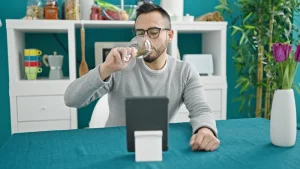
An important first step is to learn more about alcohol use disorder and your Oxford House treatment options. Alcohol use disorder is what doctors call it when you can’t control how much you drink and have trouble with your emotions when you’re not drinking. Some people may think the only way to deal with it is with willpower, as if it’s a problem they have to work through all on their own. From sleeping better to supporting your immune system, there are some significant impacts that your body may experience by embarking on a booze-free journey.
You May Sleep Better
The alcoholic’s doctor may decide to prescribe medication or recommend supervised alcohol detoxification when the alcoholic quits drinking. Heavy drinking is linked to a greater likelihood of developing many chronic health conditions. By quitting drinking, you’ll lower your risk of high blood pressure, heart disease and stroke, fatty liver, pancreatitis, and several types of cancer. Will quitting drinking solve all of your problems, in health and in life? If that’s where you’re setting your expectations, you might feel like you gave up something you loved (getting really drunk) for no good reason, even when that’s objectively not true.

Check in with your body for signs of detox
Firstly, if you think you may be dependent on alcohol, you should consult your doctor or another health professional. You could speak to your GP or a member of their team, or there are a number of national alcohol support services that you can confidentially self-refer to for advice and support. Recovery can take a long time, so you may need ongoing treatment.
Are You Feeling Suicidal?
- The alcoholic’s doctor may decide to prescribe medication or recommend supervised alcohol detoxification when the alcoholic quits drinking.
- Any information published on this website or by this brand is not intended as a substitute for medical advice, and you should not take any action before consulting with a healthcare professional.
- Creating a plan is an essential part of knowing how to quit drinking.
- You may be worried that quitting comes with bad physical symptoms such as trembling hands, nausea, sweating and other effects.
- Willpower is the hard way to quit drinking and not the Easyway to quit drinking.
- Inpatient and outpatient treatment facilities are another effective place to surround yourself with people who will walk you through detox and recovery with no judgment.
During pregnancy, alcohol use increases the risk of fetal alcohol spectrum disorders, which refers to the collective lifelong physical, behavioral, and cognitive impairments that occur due to prenatal alcohol exposure. You can also take the lead in other ways by volunteering to host or inviting people to get togethers where alcohol isn’t center-stage or even present at all, says Young. Game or craft nights, bowling, museum-exploring, and pottery are all things How to Stop Drinking that can be done sans-alcohol (though your friends might bring some anyway).


You’re likely to be in situations where you’ll be offered a drink. And practice what you might say as a follow-up explanation if someone ask. At the end of the day, one of the most important tools you have at your disposal is self-compassion. Instead of criticizing yourself for having a hard time or slipping up and having a drink, remember that no one’s perfect. What matters most is your ability to maintain an open, curious outlook as you learn what does and doesn’t work for you.
Better Sleep
Support can come from family members, friends, counselors, other recovering alcoholics, your healthcare providers, and people from your faith community. When you drink, sip slowly and take a break of 30 minutes or one hour between drinks. Drinking on an empty stomach is never a good idea, so make sure you eat food when you drink. It’s much easier to avoid drinking if you don’t keep temptations around. Once you’ve made the decision to change, the next step is establishing clear drinking goals.
For example, when it comes to the ever-popular suggestion of first-date drinks, mention that you probably won’t be drinking—but that they should free to—before making https://ecosoberhouse.com/ set plans. It’s kind of like exposure therapy for not drinking for longer periods of time. You’ll get better at navigating spaces without an alcoholic beverage in hand and build up the muscle to deal with the anxiety you have about not drinking. The experience of withdrawing from alcohol can be uncomfortable and difficult. Some people may relapse, or drink alcohol again, to relieve the symptoms. Avoid people who may encourage you to drink alcohol or may not support your decision to stop.
- “I’ve never seen severe dental fluorosis,” she said of the tell-tale discoloration of young children’s teeth from consuming too much fluoride.
- When the 30 minutes is up, feel free to order an alcoholic drink if you want one—or maybe you end up opting to wait another 30 minutes, and then another 30, and so on.
- Because substance use disorder is a complex disease, you likely have more than one trigger.
- There are effective treatment approaches that can help you quit, so talk to your doctor or a mental health professional if you need more help finding options that will work for you.
- “If your goal from this week doesn’t work out, you can try something else next week that feels more doable.
AA and Other Peer Support Groups for Alcohol Addiction
Mainstream advice recommends cutting down gradually to control your alcohol intake. Yet they don’t recognise that cutting down is even harder than stopping. How many times have you tried to cut down in the past and failed? It ends up as torture and misery, and ‘old habits’ die hard but as we explain this is not a habit. As long as you use a drug-free method that also ensures that you understand the psychological aspects of alcohol addiction – these tips will help you. In order to change your drinking habits, your first step is to take a close look at your current behaviors and find patterns.

Practice turning down alcohol in advance.
Stopping drinking can help improve both the length and the quality of your sleep, which is crucial to good mental and physical health. Millions of readers rely on HelpGuide.org for free, evidence-based resources to understand and navigate mental health challenges. Please donate today to help us save, support, and change lives.
